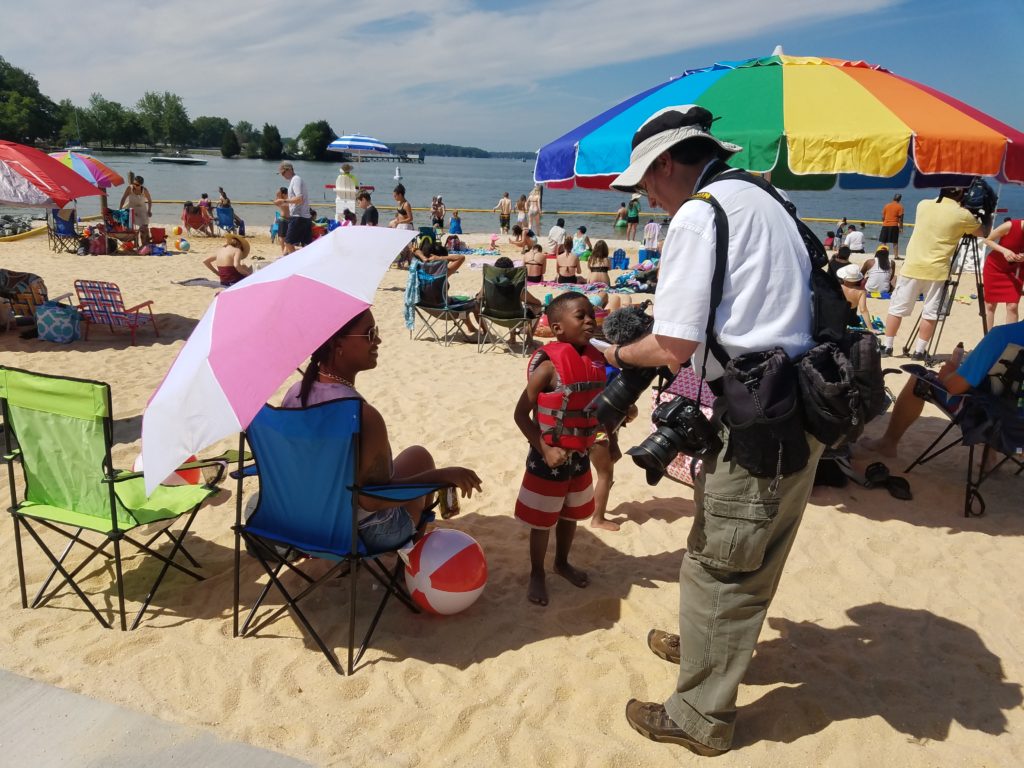
Meredith Cunningham, 6, gets his picture taken by a charlotte observer photographer. Mom is Alisha Samuel
June 19. It’s going to be extra-hot today—95 in Cornelius according to the National Weather Service. You can be injured by the heat, ranging from heat rash to heat exhaustion and even stroke. Around 600 people in the United States are killed by extreme heat every year. Ramsey Creek Beach is open and the water is a relief, even though lake temps are approaching 90 degrees. Malls are great places to cool off as well. The important thing is stay cool and hydrated, check in on elderly friends.
Some people are more at risk of developing a heat-related illness, including adults age 65 and older, those with chronic medical conditions, people who work outside, infants and children and athletes.
These heat safety tips come from the American Red Cross:
- Hot cars can be deadly. Never leave children or pets in your vehicle. The inside temperature of the car can quickly reach 120 degrees.
- Stay hydrated by drinking plenty of fluids. Avoid drinks with caffeine or alcohol.
- Check on family, friends and neighbors who do not have air conditioning, who spend much of their time alone or who are more likely to be affected by the heat.
- If someone doesn’t have air conditioning, they should seek relief from the heat during the warmest part of the day in places like schools, libraries, theaters, malls, etc.
- Avoid extreme temperature changes.
- Wear loose-fitting, lightweight, light-colored clothing. Avoid dark colors because they absorb the sun’s rays.
- Slow down, stay indoors and avoid strenuous exercise during the hottest part of the day.
- Postpone outdoor games and activities.
- Use a buddy system when working in excessive heat. Take frequent breaks if working outdoors.
- Check on animals frequently to ensure that they are not suffering from the heat. Make sure they have plenty of cool water.
HEAT EXHAUSTION
Excessive heat can lead to sunburn, heat cramps, heat exhaustion and heat stroke. If someone is experiencing heat cramps in the legs or abdomen, get them to a cooler place, have them rest, lightly stretch the affected muscle, and replenish their fluids with a half a glass (about 4 ounces) of cool water every 15 minutes.
If someone is exhibiting signs of heat exhaustion (cool, moist, pale or flushed skin, heavy sweating, headache, nausea, dizziness, weakness, exhaustion), move them to a cooler place, remove or loosen tight clothing and spray the person with water or apply cool, wet cloths or towels to the skin. Fan the person. If they are conscious, give small amounts of cool water to drink. Make sure the person drinks slowly. Watch for changes in condition. If the person refuses water, vomits or begins to lose consciousness, call 9-1-1.
HEAT STROKE LIFE-THREATENING
Signs include hot, red skin which may be dry or moist; changes in consciousness; vomiting and high body temperature. Call 9-1-1 immediately if someone shows signs of heat stroke. Move the person to a cooler place. Quickly cool the person’s body by immersing them up to their neck in cold water if possible. Otherwise, douse or spray the person with cold water, or cover the person with cold, wet towels or bags of ice.
DOWNLOAD RED CROSS APPS
The Red Cross app “Emergency” can help keep you and your loved ones safe by putting vital information in your hand and settings for more than 35 different severe weather and emergency alerts including heat advisories and excessive heat warnings. The Red Cross First Aid App puts instant access to information on handling the most common first aid emergencies at your fingertips including heat-related emergencies. Download these apps by searching for ‘American Red Cross’ in your app store or at redcross.org/apps.




